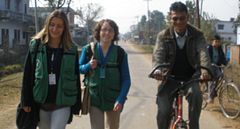Bardiya, in midwestern Nepal, is one of the districts most affected by the conflict, where five years after the peace agreement, many victims and their families are still struggling to meet daily needs while fighting for justice. As the district that witnessed the highest number of enforced disappearances during the conflict, many families remain wanting information on the fate of their loved ones. Conflict Victims’ Committee (CVC), one of PBI-Nepal’s partner organisations, has been conducting programs in the region, raising awareness of the victims' rights to justice.
In 2008 the Maoist-led coalition government promised that financial aid in the form of interim relief would be provided to conflict victims. The edict was intended to be distributed through local Peace Committees, which would be responsible for verifying that all those claiming relief were genuine conflict victims before distributing one lakh rupees – approximately US$1,300 – to each family. The first in line to receive compensation were families of those who were killed during the conflict. In a country where there is no law against disappearances, the families of those who were disappeared, whether by State or Maoist forces, were left to continue their wait.
Since December 2008 PBI has learned that this delay of justice has led some whose family members were disappeared to re-register the cases as deaths. There are many reasons for such a move, including not only the hope of access to the first round of interim financial relief but also legal issues related to property, inheritance and citizenship. Particularly, for women, publicly acknowledging that their husbands are dead is important for their social status, with those who refuse to do so often being subjected to sexual harassment as they do not observe the traditional practices of widowhood.
>> Read the full article in PBI Nepal's latest edition of Namaste

